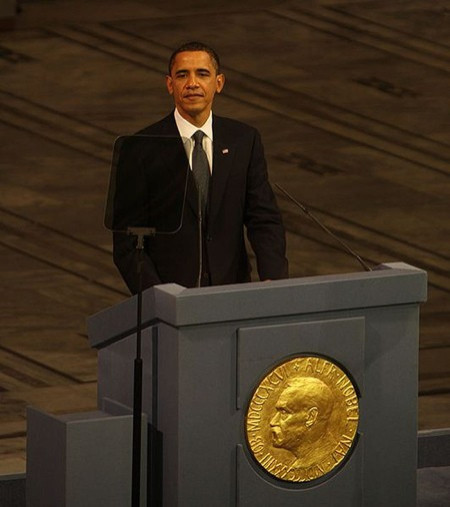Nobel Peace Prize 2011 Winner Might Want to Send Honor Back to Oslo
Nobel 'Curse' Haunts Many Winners With Criticism, Scandal, Loss

A collapse in popularity, scandal, illness, prison. These, among other things, have seemingly befell winners of humanity’s most prestigious award over the past decade, a correlation so disconcerting some might even call it a “Nobel curse”
Established in 1901 as a recognition to individuals whose work had served to defuse hostility between nations, the Peace Prize was, for its first 60 years, generally awarded to diplomats, politicians and others who had been directly involved in peace negotiations of one kind or another. Since the 1960s, the Prize has increasingly been focused on recognizing civil society leaders whose work has been transformative within specific societies.
Front-runners for this year's prize, which is announced tomorrow, include the leaders of the 'Arab Spring' uprisings and the people behind the Wikileaks government transparency movement.
And perhaps that's not such a good thing for them. A look at the Nobel laureates over the past 10 years reveals how most have had to face all manner of hardships after receiving the prize. While a causal relationship would be hard to ascertain, the sheer anecdotal information is enough to raise suggestions of a ‘curse’
So, how have the past decade’s winners fared?
Loss in popularity
The most common malady experienced by a Peace prize winner after being recognized is a sudden surge in criticism followed by a sharp drop in popularity. Some cases seem to have occurred as a direct result of the considerable level of media attention laureates receive.
Two examples of that causality are Wangari Maathai (the 2004 winner) and the Grameen Bank (who shared the prize in 2006). Maathai, an environmental activist from Kenya who was recognized for “her contribution to sustainable development, democracy and peace” was embroiled in a controversial media spat for claiming AIDS was a man-made agent. Although she was recognized by various cultural organizations after her Nobel nod, she lost her parliamentary seat in 2007. The Grameen Bank, which was recognized for pioneering work in microcredit, has seen the focus the prize brought result in criticism. It has been accused, among other things, of cooking its statistics, evading taxes, and pushing debt on communities that may not be able to handle it.
Other cases of criticism do not seem to be so intimately linked to the fact the prize was awarded. Former U.S. president Jimmy Carter has seen his fair share of criticism since being recognized in 2002, though in his case, it seems more related to the fact he was a constant detractor of George W. Bush during the latter’s tenure, breaking the gentleman’s agreement in U.S. politics that frowns upon former presidents commenting on current ones. The Intergovernmental Panel on Climate Change, which split the honor in 2007 for its work on global warming, has not only seen a stream of criticism as to its practices, but also dealt with a growing wave of ‘climate change skeptics’ since being recognized.
All those drops in popularity pale in comparison to that experienced by U.S. President Barack Obama, who received the medal in 2009 for his efforts at international diplomacy. Since then, the Middle East peace and nuclear non-proliferation initiatives for which he was mostly being recognized have blown up in his face, and his popularity at home is at an all-time low.
Scandal
The UN Secretary-General Kofi Annan had barely set his 2001 medal on his office mantel when two scandals broke that would irreparably tarnish him with the stench of cronyism. A first scandal in 2004 resulted when Annan cleared a subordinate of a sexual harassment charge, only to be reversed by an internal UN investigator. A second, wider scandal involved payments made to a company owned by his son under the UN’s Oil-for-Food programme with Iraq. Annan, who grew increasingly critical of U.S. policy as his term progressed, seemed troubled by what these scandals had done to his accomplishments. In one of his 2006 farewell speeches, he was downright pessimistic on his legacy, noting the world’s problems had “not resolved, but sharpened” under his watch.
Loss of liberty or property
Shirin Ebadi, a pro-democracy Iranian lawyer who received the award in 2003, says she has received death threats related to her work since then. In 2004, she began a long legal battle with the United States over restrictions on releasing her novel there (as an Iranian writer, she is subject to certain embargo rules). Perhaps most distressingly, she reported in 2009 that the Iranian Revolutionary Court had seized her Nobel prize (and other valuables) from a bank safe.
Liu Xiaobo, last year’s winner has perhaps fared the worst of anyone on this list. The Chinese pro-democracy activist, was already serving a lengthy prison sentence when he was recognized by the Nobel committee. It only got worse. He was criticized by both the government and fellow Chinese dissidents. Prominent intellectuals linked to him were detained or harassed and his wife was placed under house arrest. Xiaobo is still in prison.
© Copyright IBTimes 2025. All rights reserved.





















